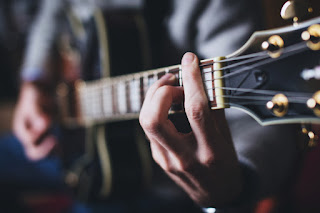Can guitar lessons help children overcome dyslexia?
It depends. According to accepted research:
- For some children with dyslexia, reading music may be easier than reading text.
- Children who struggle not only with reading words but also with understanding how symbols work might find reading music difficult.
- There are many strategies that can help dyslexic children perform and enjoy music in their own unique way.
Trouble with reading words can also impact a child’s ability to read, decode and interpret music notation. That doesn’t mean children with dyslexia can’t learn to play music and enjoy doing it, however. Dyslexia is different for each child and finding what works for each individual is the key.
For example, music isn’t written the same way for all instruments. There’s a big difference between reading drumming, piano, and guitar notation. While your child might have difficulty reading drum music, guitar notation might feel quite natural. The only way to know is to try.
Just as children with dyslexia don’t learn to read in the same way, they don’t all learn to play music in the same way. Some common challenges I have seen include:
- Learning a new vocabulary in which familiar words have a different meaning. These words include note, key, bar, sharp and flat.
- Visual tracking from left to right, and top to bottom.
- Decoding music symbols. Some children may have trouble noticing details like whether the stem of a note goes up or down or understand the meaning of symbols like repeat dots or a coda sign.
Some research suggests learning to read music may actually help children learn to read text and improve their ability to process speech sounds. None of the studies I have personally reviewed are definitive on this point, unfortunately. Further funding of much larger trials may yet establish a strong connection.
My personal experience of teaching dyslexic students is that when it works the results can be amazing for all concerned. Here are some of the strategies I use when teaching guitar to children with dyslexia:
My personal experience of teaching dyslexic students is that when it works the results can be amazing for all concerned. Here are some of the strategies I use when teaching guitar to children with dyslexia:
- Tracing the melody with a finger on the score and then drawing it in the air or on paper.
- Raising and lowering hands in response to changes in pitch.
- Clapping rhythms to raise awareness of the beat.
- Writing notes in different colours on sheet music to make them stand out.
- Teaching a non-notation based musical system for guitar called tablature.
- Patience.
If your child is not really interested in music or in playing an instrument, it may not be worth pushing it. They may be facing enough challenges with reading.
If he or she is really motivated, however, encourage your child! Many children with dyslexia are successful at learning music. If your child wants to give it a try, playing music can bring them a lot of joy—and a feeling of unrivalled accomplishment.
Here are just some of the many children with dyslexia who grew up to be pretty good musicians:
- Carly Simon
- Jewel
- Joss Stone
- Lou Reed
- Noel Gallagher
- Ozzy Osbourne
- Stewart Copeland
- Tony Bennett
- Your child?



Comments
Post a Comment